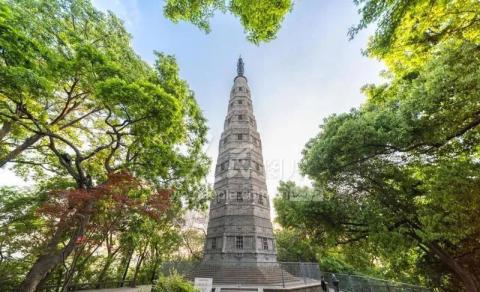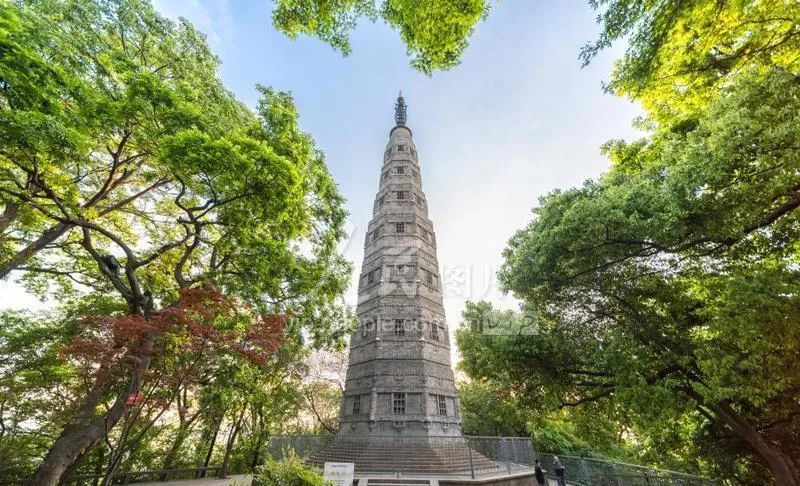

Some people say that among the famous pagodas in Hangzhou, Baochu Pagoda is as graceful as a beauty, Leifeng Pagoda is as stable as Lao Na, and Liuhe Pagoda is shaped like a general. The Six Harmonies Pagoda is located south of the West Lake in Hangzhou, on the Yuelun Peak on the bank of the Qiantang River. In the third year of Kaibao in the Northern Song Dynasty (AD 970), the King of Wuyue sent the monk Zhiyuan Zen Master to build this pagoda in order to control the tide of the Qiantang River. The current Liuhe Pagoda was a product of reconstruction during the Southern Song Dynasty.
The name of Liuhe Pagoda often appears in the ink of many literati, and Mr. Jin Yong is one of them. His "The Legend of the Condor Heroes" started from Niujia Village on the edge of the Qiantang River. "Eternal Dragon Sword" uses the eyes of Yu Daiyan, one of the Seven Heroes of Wudang, to let readers experience the grand occasion of the Qiantang Tide.
Jin Yong's martial arts novel "Book of Swords and Enemies" also describes the Six Harmonies Pagoda and the Qiantang Tide. Wen Tailai, the fourth leader of the Red Flower Club, was captured by the Qing army, escorted from the northwest desert to Hangzhou City, and imprisoned in the Liuhe Pagoda. In order to save people, the brothers of the Red Flower Society fought to the death with the Qing eagle dogs in the tower. In the midst of the fierce battle, the earth suddenly shook and the mountains shook, and the Qiantang River tide covered the sky and the moon, rolling in like a silver dragon, with the momentum to swallow up the mountains and valleys in one gulp.

Book The description of Qiantang tide is extremely delicate: “I saw a white line in the distance, slowly moving in the moonlight. Suddenly, the coldness became overwhelming, the white line moved closer and closer, the sound was like thunder, the tide was like a jade city and snowy mountains, coming from the sky, with a majestic momentum. The closer the tide gets, the louder the sound becomes, just like a million troops charging forward, advancing unstoppably to the sound of drums and gongs. . ”
Haining's Qianjiang Tide, known as the "Wonder of the World", has been a trend of tide watching since the Han Dynasty, and became even more popular during the Tang and Song Dynasties. Mr. Jin Yong vividly displayed the majestic momentum of the "Haining Qiantang River Tide" in the tone of a person from the Qing Dynasty, which stems from his personal experience of being in the tide since he was a child.
Jin Yong and Xu Zhimo are both from Haining and are cousins. His father died during the regime change, and Jin Yong fled Hong Kong from then on. Not only did he leave a way to survive, but he also became the top writer of martial arts novels. and.

That In fact, Liang Yusheng, another martial arts novelist of the same generation as Jin Yong, had a similar experience. Liang Yusheng's ancestors were a prominent family in Mengshan County, Guangxi. During the land reform, Liang Yusheng was studying far away when he received an urgent letter asking for help. He rushed to his hometown despite wind and rain. On the way, he met a kind-hearted classmate who told him the truth: his father had just been beaten to death and all the family property had been lost. Going back now would be like a sheep walking into a tiger's mouth. Liang Yusheng was so frightened that he broke out in a cold sweat. After many twists and turns, he finally settled in Hong Kong.
Just imagine, these two talented young people stayed with their parents. Even if they were lucky enough to embark on the path of literary creation, in a specific historical atmosphere, how could they use a free and unrestrained style to push modern Chinese martial arts novels to the extreme.
When Jin Yong was young, he should have witnessed the great tide of the Qianjiang River. The description of the great tide in "Book of Swords and Enmities" is really wonderful. So much so that after reading his martial arts classics, I often stare at the bright moon in the sky when the night is high and the stars are bright. Why doesn't the same bright moon make the river around me as majestic as the Qiantang River?

Shi Naian, the author of "Water Margin", is also a master of describing the Qiantang tide. In his writing, Song Jiang's group was recruited by the court and ordered to come to Hangzhou. The heroes of Liangshan at this time are already unjust masters. The battle with Fang La was a complete defeat, and even Wu Song lost an arm. The one-armed Wu Song did not return to the court with Master Song Jiang, but escaped into the Liuhe Pagoda with the great monk Lu Zhishen.
Today, by the Xiling Bridge in Hangzhou, the "Tomb of Wu Song, a Yishi of the Song Dynasty" stands, and the stone archway is engraved with a literary couplet: "When you are frustrated, there is a wealthy guest, and when you are lucky, there is also a hero." It is said that in the history of Hangzhou, There is indeed Wu Song, and he is also a tough-minded hero.
In the heroic spectrum of "Water Margin", I have a pretty good impression of Lu Zhishen. He killed the bully in Guanxi with three punches and rescued the instructor of the 180,000 forbidden army in the wild boar forest. He is a veritable hero.

Lu Zhishen saw his brothers dying, dying, and was extremely sad. So, I came to Liuhe Pagoda Temple to think about my mistakes behind closed doors. One night, while I was sleeping, I suddenly heard the sound of the river tide sounding like a drum. I thought it was a powerful enemy chasing me. I picked up my Zen staff and tried to kill him. However, I was stopped by the monks who told me that this was the sound of Jiang tide. After Lu Zhishen listened, he suddenly remembered the verse that his master had given him: "Listen to the tide and become full, see the faith and become silent." Then he passed away that night.
Legend has it that Lin Chong, the instructor of the 800,000-strong Forbidden Army, also completed his final journey in the Liuhe Pagoda. Among the one hundred and eight generals in Shuibo Liangshan, Lin Chong is the character I sympathize with the most. He is highly skilled in martial arts, upright, and quite restrained. Because his beloved wife was humiliated and framed by powerful forces, he was desperate and forced to go to Liangshan. "My husband doesn't shed tears lightly, but he hasn't reached the point where he is sad." Every time I hear this libretto from the Peking Opera "Lin Chong Runs at Night", I feel infinite emotion in my heart.
Lin Chong was seriously injured in the bloody battle and was taken to the Liuhe Pagoda by Lu Zhishen. From then on, he lost all hope. Lin Chong, Lu Zhishen, Wu Song, these famous northern men in "Water Margin", may be able to sleep in such a tidal place, maybe it is the mercy of God.

In China, many ancient cities have pagodas as landmarks, and the Six Harmonies Pagoda in Hangzhou is particularly representative. The name of Liuhe Pagoda is taken from the Buddhist meaning of "Six Harmonies", which implies the supreme realm of "heaven, earth, and people", allowing auspiciousness to encompass mountains and seas, and harmony to embrace all things.
On the way to Shaoxing and Qiandao Lake, I looked up at the Liuhe Pagoda on Yuelun, and also swam past this tower on foot with my friends. Standing on the top of the tower, you can overlook the river cruise ships, the buildings on the other side, the lush mountains, and the Qianjiang River Bridge.
The Qiantang River Bridge is a masterpiece of China's famous bridge expert Mao Yisheng as early as the 1930s. At that time, in order to prevent the Japanese invaders from invading Hangzhou from Shanghai, the bridge was destroyed only one month and six days after it opened. After the victory of the Anti-Japanese War, it was rebuilt. Together with the bridge, the bronze statue of Mao Yisheng became a glorious portrayal of that period of history.

When you come to Hangzhou, if you time it right, you must not miss the Qiantang Tide. The wonder of the spring tide in the Qiantang River is that the retreating waves collide with the rising tide, over and over again, one wave higher than the other, like a high wall lying across the river, overwhelming mountains and seas, swallowing up the sky and the sun. Listening to the tide of Qiantang at Liuhe Pagoda, you realize that life is like a feather. This is my personal experience of the Qiantang River tide.

When watching the tide in Qiantang, Yanguan is the first choice. Yanguan is a thousand-year-old city. The mystery of Emperor Qianlong’s life experience once made this small town full of legend. In fact Emperor Qianlong visited Yanguan many times, mostly because of the floods here. Looking back at history, many responsible officials worked hard to prevent Qiantang tides, risking their lives.
The river tide is rolling, and there is always mud and sand falling, and fish and dragons are mixed together. In the forty-sixth year of Qianlong's reign, Wang Danwang, the governor of Zhejiang, committed fraud in the seawall management project and enriched himself. As a result, the Qiantang River burst its embankment, causing heavy casualties among the people of Hangzhou. Qianlong was furious, and Wang Danwang was beheaded and his house ransacked. 778 Zhejiang officials were implicated, 57 were executed, and 56 were exiled.

Before writing this travelogue, I asked a friend from Yanguan Town, my ancestral home, to come to a teahouse to talk about it, hoping to capture some sparks of inspiration from him. Who would have thought that this brother would get right to the point. Today's Qiantang tide has long lost the grandeur of his childhood. As for his parents' generation's eyes on the Qiantang tide, we can only learn from the writings of past literati .
My friend and I hit it off in imagination. A few years later, on the full moon night of August 15th, with his head resting on the reflection of the Liuhe Pagoda, would the poet still be able to hear the sound of today's tide? At that time, the tide in Qiantang could be the sword-fighting company described by Xin Qiji? Or a jug of wine among the flowers in Li Bai's hand?
——To be continued
